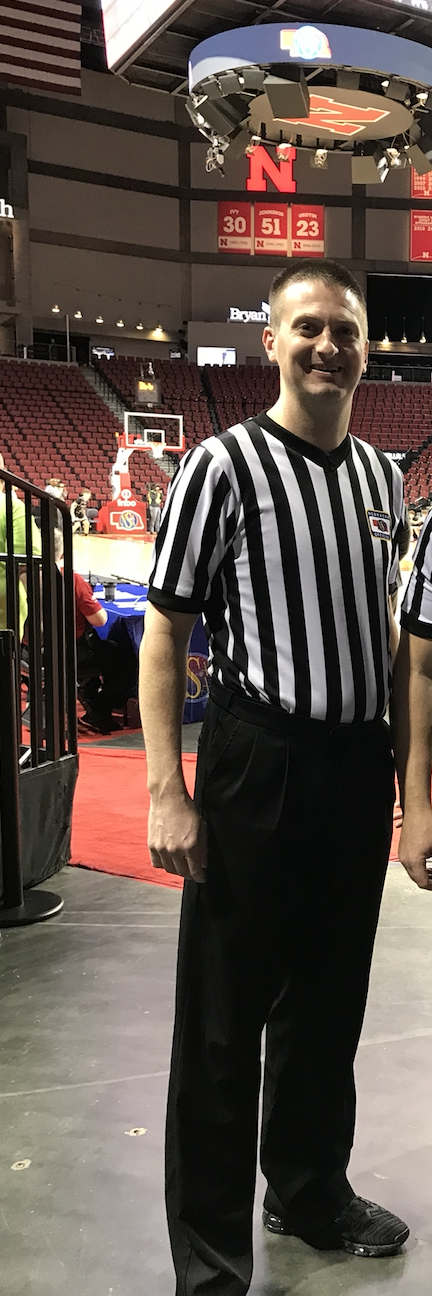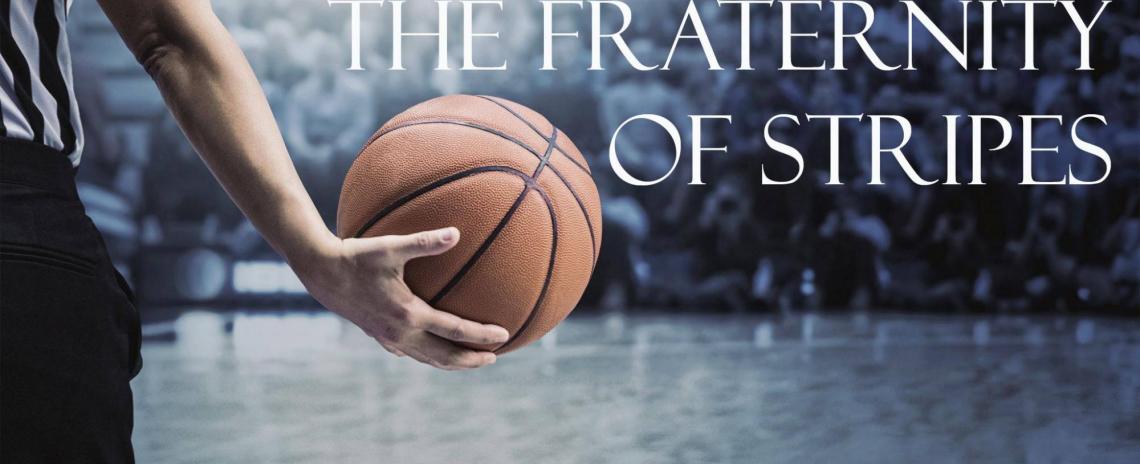The Fraternity of Stripes: Administrators by day, officials by night find transferable skills in between
The Fraternity of Stripes: Administrators by day, officials by night find transferable skills in between
By Tyler Dahlgren
Not a whole lot rattles Jeff Schwartz at his day job.
Considering he’s the principal of Axtell Community School, a PK-12 building, that’s saying something.
Where does Schwartz’s resolve come from? Well, ask him about his night job.
“It’s kind of funny,” he tells co-workers who compliment his calm composure. “I leave my regular job and go to a place where fans yell at me, and I kind of enjoy it.”
If you haven’t put together the pieces yet, here’s a couple more hints: Schwartz wears zebra stripes and blows into a whistle and keeps an eye out for the best popcorn in high school concession stands across the state. Fremont, by the way, adds M&M to the popcorn bowls, a nice touch of hospitality. He’s a basketball official, a member of the surprisingly large fraternity of educators who moonlight by maintaining order on the hardwood or the gridiron, the mat or the pitch.
In fact, officiating and school administration walk hand-in-hand. Brad Dahl is the Associate Superintendent at Fremont Public Schools, and though he hung up his whistle awhile back after a 25-year run, many of the skills he learned while refereeing basketball ended up being transferable.
Such as planning, management and, perhaps above all, communication.
“You had to learn to communicate on the floor rather quickly in front of thousands of fans with your two or three partners,” Dahl, who worked collegiate games, too, said. “The management of people, that has definitely been transferable. You’re working with different people all of the time, so how you make them better and how they make you better, that was really important.”
Like Dahl, Jeff Schneider is a retired official, having worked his last basketball game in 2018 just before stepping into his current role as superintendent of Hastings Public Schools. When he looks back on a side-career that started back in his first year of teaching, it’s the people, the kids and the coaches and the fans, that stick out the most.
“A lot of the refereeing I did was within a sixty to seventy-mile radius of Hastings, so you get to know a lot of schools and kids and communities fairly well,” he said. “You watch siblings come through, neat things like that, and it’s all just a lot of fun. It was a great way to stay involved in athletics.”
For Schwartz, officiating runs in the family. For 40 years, his parents refereed volleyball together. They retired this year. He has an uncle who’s worked basketball games since his early 20s that he credits with getting him involved initially. That and a past that included two years of college basketball and an enduring itch to remain involved in the game.
Schwartz, now in his 14th year of officiating, was 21 when he started. That first year, he signed up for everything. Volleyball, football, baseball. You name it.
“If there is one thing I can tell college kids, it’s that officiating is probably one of the best college money-makers out there, especially if you enjoy sports,” Schwartz, who has dwindled his juggling act down to basketball, said. “Basketball was my main passion, the one I didn’t want to give up. I’ve worked at the high school and college level, and it’s been a joy.”
Officiating provided all three an opportunity to learn more about the people who bring schools to life across the state. Nebraskans, they all adamantly agree, are special. So are the relationships paved on the paths from gymnasium to gymnasium along the way.
“The number one thing I can tell you about the state of Nebraska is that there is a tremendous amount of pride from communities in their schools,” said Dahl. “They love their schools. They are passionate about their schools. And, often times, the teams they put on the playing fields or basketball courts are representing them as a community. They have a huge sense of pride as a result of that.”
There are good people in Nebraska, said Schwartz, who has worked games from Omaha to Ogallala and cherishes the relationships developed in between. Relationships, he adds, are imperative to officiating. Strong ones usually lead to smooth sailing.
“That gets you a long way,” he added. “I’m in a profession where working with kids is what I love to do. I think that’s why officiating comes natural for me, because I enjoy being around those kids. If you can joke around with them, let them know that you might make a mistake, but they’re also going to miss a shot, then we can be on the same page and it’s all going to be okay.”
Winters in Nebraska are long. They’re dark and unrelenting and prone to doldrums. Getting out on the court at night in front of screaming fans and vibrant coaches and inspired teams is an instant shot of infectious energy.
For Dahl, those midweek games were therapy.
“The only thing I was thinking about on those nights was the action happening right in front of me, and that was a beautiful thing,” he said. “It was therapeutic to be on the basketball floor and to watch these coaches coach their butts off and these players work their butts off. I do miss that side of it.”
After a stressful day at school, piling into the car and travelling however many miles to an assignment on a Tuesday night was a fun way to cool down. On those highways, these three refs found a center. A calmness and, yes, a passion.
“Half the fun was the drive to and from the game,” said Schneider. “Getting to know the coaches, I miss that too. Although the older I got, the younger those coaches got. But for a long time it was the same coaches at every school, and it was a lot of fun seeing them regularly.”
The camaraderie was top-notch, as were the atmospheres under the rafters in that particular night’s gymnasium. The fraternity of officials, Dahl adds, is one-of-a-kind.
“We developed friendships and had mutual support for one another,” he said. “When you’re out there on a Tuesday night and people are yelling and hollering, you’re going to battle with two other people and there’s a serious bond developed there. That made it special, and enhanced the value of the therapy that came with the exercise and the extra little bit of coin in your pocket.”
The biggest misconception about referees, and Schneider, Schwartz and Dahl all believe this to be true, is that a crew enters a game with a preference or a care concerning who comes out victorious. Refs don’t walk into a gym with an opinion, said Schneider, though, as a parent himself, he admits it can be easy to forget that from time to time.
“Referees, especially the good ones, hope there is no controversy in a game and that the kids decide the outcome,” he continued.
Above all, referees want to do a good job.
“They want to keep the kids safe and they want it to be a good experience,” added Dahl.
State tournaments are all high on their lists of memorable games worked, whether it be a football game at Memorial Stadium (in Schneider’s case), or a shoot-out between Omaha Benson and Westside in front of 13,000 Nebraskans inside Pinnacle Bank Arena (in Schwartz’s), there’s something special about the state’s premiere event, when the stage is at its biggest and the lights are at their brightest.
“Those are just electric environments,” Dahl said of the state basketball tournaments, of which he worked many. “The experience that kids get down there in Lincoln is second-to-none. The NSAA does such a phenomenal job of putting together an event that truly rewards kids, coaches and communities for all the work they put it over the winter.”
Sometimes, though, it’s in the stadiums and arenas closest to home where officials feel the most heat.
“The most challenging place for me to ref was Adams Central, only because our districts are four miles apart and everybody knows everybody,” said Schneider. “You always wanted those games to go well on a Friday night, because on Saturday morning you were bound to run into everybody.”
It’s all fun and games until you run into a disgruntled fan during a Saturday morning milk run to the grocery store.
Dahl, who like Schwartz started officiating to stay involved in the game, likes to say that there are two kinds of referees: Ones who retire, and ones who rupture their Achilles. He jokes that he's lucky to be in the former group. Still, he misses the grind from time to time, the therapy it provided.
"You got to walk away from whatever your job was at the time, the stressful day at work, and you got to go meet up with a couple of guys or gals that really made up a fraternity of folks, men and women," he said. "We had friendships and mutual support for one another. I miss the relationships."
At the end of the day, it’s those games that get the blood flowing, those match-ups between two rated squads or two rival schools, that are the most enjoyable to officiate. Those games where the referees are going to be held to a higher standard, well, those are the ones that Schwartz and his fraternity of officials enjoy the most.
“Those high-caliber games where you know it’s going to be a dog fight and you’re going to have to be on top of it because the coaches are going to expect it out of you, the fans are going to expect it out of you and the officials you’re working with are going to expect it out of you,” Schwartz said. “As officials, those are the games you want to take.”
Talk about a night job.

Above: Jeff Schwartz is the PK-12 Principal at Axtell Community School and a 14-year referee. The most memorable game of his officiating career was a shoot-out at the state tournament in Lincoln between Omaha Benson and Westside. "It was just rocking," he said.


